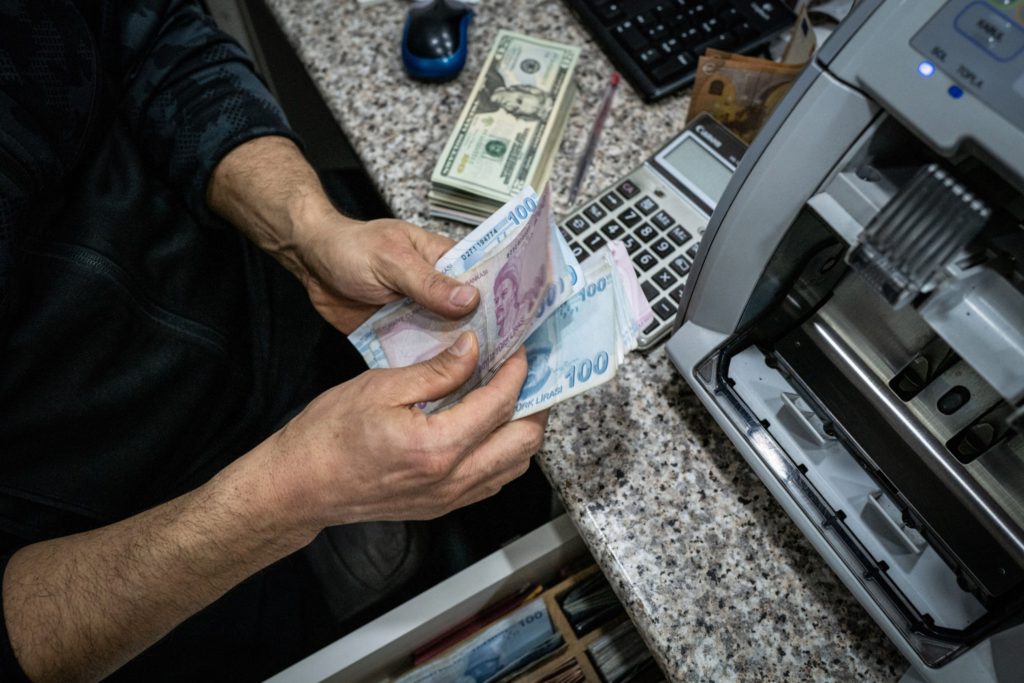(Bloomberg) — Turkey’s central bank said it would prioritize measures aimed at encouraging savers to use lira deposits in 2022 even as the currency resumed a slide that’s seen it lose nearly 40% of its value this year.
Steps will be taken to make the lira more attractive than foreign currency, the bank said Wednesday in a paper that sets out monetary and foreign-exchange policy for the coming year. Policy makers will also stick to a 5% medium-term inflation goal — even as the rate of consumer price increases exceeds 20% — while jettisoning the tighter monetary policy pledge made by former Governor Naci Agbal a year ago.
December has been one of most tumultuous months for the lira in decades. The currency slumped as much as 27% from the Nov. 30 close to a record low on Dec. 20 as the central bank pushed ahead with interest-rate cuts at the behest of President Recep Tayyip Erdogan. Then it recovered as much as 73% last week when authorities announced a series of controversial measures to put it on a more stable footing.
Analysts have dismissed the central bank’s latest guidance — which goes against mainstream economic thinking — as unworkable and say unorthodox measures to boost lira demand can’t offer more than temporary relief.
“Turkey’s attempt to lower inflation from more than 20% to 5% while cutting monetary-policy rates aggressively is doomed to fail,” Per Hammarlund, the chief emerging-markets strategist at Skandinaviska Enskilda Banken AB in Stockholm. “The Turkish authorities cannot have their cake and eat it, too.”
The central bank had already signaled its commitment to encouraging lira deposits. It said this week it would support the conversion of foreign exchange and gold-savings accounts to lira accounts and pay higher returns to commercial lenders that switch some of their foreign-currency deposits at the central bank to lira.
Earlier this month, it unveiled a new mechanism that would see the government compensate holders of lira deposits if the currency’s declines exceed bank interest rates.
Although Erdogan’s popularity is suffering from the inflation that’s accompanied the lira’s decline, he’s stuck to his position that interest rates are holding back the economy, and promised to stabilize the currency through the latest series of measures.
Yet his plans don’t address the root causes of the crisis or the government’s credibility gap, and there are signs his broader approach is backfiring, analysts say.
The lira slipped 5% against the dollar on Wednesday, extending this week’s losses to 15%, with traders saying that people aren’t rushing to Erdogan’s new products. Investors say the market is pricing in future inflation and don’t see the lira recovering anytime soon despite the recent measures, given the government’s insistence on cheap borrowing.
Surveys ahead of the Jan. 3 inflation-data release forecast inflation will accelerate to about 27%.
The yield on 10-year government bonds has climbed more 7 percentage points since the central bank began slashing rates in September. It was at a record high of 24.9% on Wednesday.
Erdogan has said his policies aim to boost production and exports, reducing the influence of international markets on Turkish monetary policy. He sacked former central bank Governor Agbal after just four months last March, two days after he hiked borrowing costs by 2 percentage points. His successor, Sahap Kavcioglu, has duly cut the benchmark rate by 500 basis points since September, despite widespread criticism from investors.
The central bank’s setting of an ambitious inflation target has become an annual rite in Turkey, even though it hasn’t been met for years. It appears more unreachable than ever given the global context of rising inflation and monetary tightening in developed economies combined with Erdogan’s policy shifts.
“It’s necessary to have a basis for fighting inflation in order to express this target in a realistic way,” Enver Erkan, an economist at Tera Yatirim in Istanbul, said in a note. “It will be difficult to reduce inflation to single digits until 2024 unless there are major disinflationary developments in current dynamics.”
The central bank said it also aims in 2022 to replenish foreign-currency reserves depleted by the lira’s decline. International net reserves dipped about $9 billion in the week ended Dec. 17, the biggest weekly drop since at least 2002.
Other key takeaways from the central bank’s document:
Reserves will accumulate in 2022 through rediscount loans
Central bank may gradually reduce FX sales to state institutions
Swap transactions conducted by the bank will be gradually reduced.











